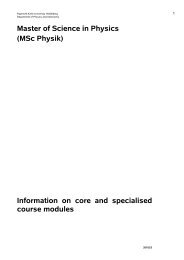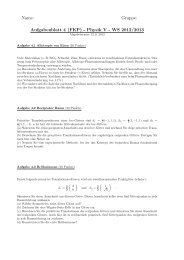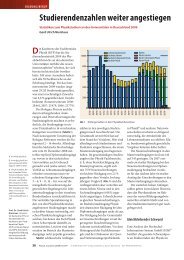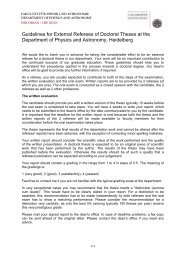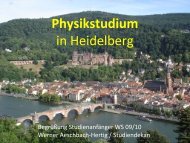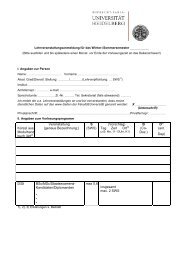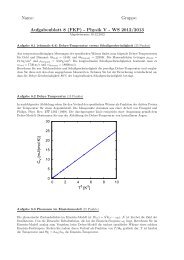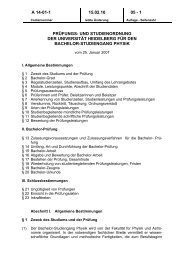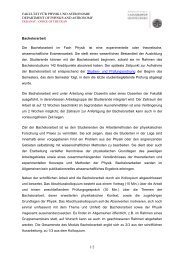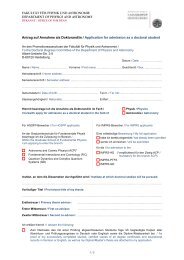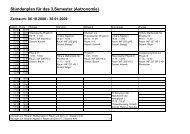Master - Fakultät für Physik und Astronomie
Master - Fakultät für Physik und Astronomie
Master - Fakultät für Physik und Astronomie
Create successful ePaper yourself
Turn your PDF publications into a flip-book with our unique Google optimized e-Paper software.
Ruprecht-Karls-University Heidelberg 67<br />
Department of Physics and Astronomy<br />
Code: MVTheo2<br />
Course Title: Condensed Matter Theory<br />
Programme: <strong>Master</strong> of Science (Physics)<br />
Type: Lecture with exercises<br />
Credit Points: 8<br />
Workload: 240 h<br />
Teaching Hours:<br />
6/week<br />
Mode:<br />
WPM<br />
Term:<br />
SS<br />
Module Parts:<br />
• Lecture on Condensed Matter Theory (4 hours/week)<br />
• Exercise (2 hour/week)<br />
Module Contents:<br />
• Introductory materials: bosons, fermions and second quantisation<br />
• Green‘s functions approach<br />
• Exactly solvable problems: potential scattering, Luttinger liquids etc.<br />
• Theory of quantum fluids, BCS theory of superconductivity<br />
• Quantum impurity problems: Kondo effect, Anderson model, renormalisation group<br />
approach<br />
Depending on the lecturer more weight will be given to solid state theories or to soft matter.<br />
Objective: The goal is to give a comprehensible introduction into the topics and methods of<br />
modern condensed matter theory. The course consists of two parts. The first one starts with<br />
an instruction on the nowadays `traditional´ diagrammatic technique supplemented by a<br />
detailed survey of the problems which are solved using this method, including Landau's<br />
theory of quantum liquids and BCS theory of superconductivity. The second part of the<br />
course deals with problems which require the use of more advanced non-perturbative<br />
approaches such as renormalisation group transformations, bosonisation and Bethe<br />
Ansatz. These concepts will be introduced on the examples of quantum impurity problems<br />
such as potential scattering in Luttinger liquids, inter-edge tunnelling in fractional quantum<br />
Hall probes and Kondo effect in metals and mesoscopic quantum dots.<br />
Necessary/useful Knowledge: Content of PTP4, MKTP1, Complex Analysis<br />
Recommended Literature: To be announced by lecturer<br />
Specialties: Exercises with homework<br />
Form of Testing and Examination: To be defined by lecturer before beginning of course<br />
2012.1/v2



